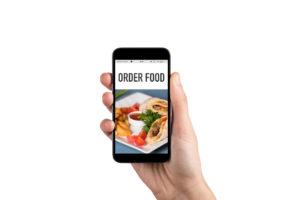- Solutions
-
-
Use Cases
-
-
- Our Resources
ARTICLES
- Blogs
- Case Studies
DOWNLOADABLES
- eBooks & Whitepapers
- Videos
- Company
- Contact Us
- Request Demo
Use Cases
ARTICLES
DOWNLOADABLES
Executive Summary
Industry expert Luis De Souza of NFS Technology says digital dining has accessed every area of the industry; and it’s providing a valuable boost in challenging times.
“Here’s your burger and fries, sir – would you like extra digital with that?”
The answer from today’s diner is almost always a resounding yes, according to restaurant industry expert Luis De Souza.
And he’s convinced that the digital transformation trend is truly engaging the UK restaurant industry could well provide answers to some of today’s challenges.
“We’ve seen an extraordinary pace of change in diner behaviours over the past few years, and restaurants are having to work hard to keep up with it,” said Luis, chief executive of Restaurant Show exhibitors NFS Technology.
The changing digital landscape
The trends he is talking about affect both in-restaurant and takeaway eating and are affecting everything in the casual and fast-casual dining sectors.

To-go consumers used to call in and wait while their food was prepared; now, they order online, either for collection or delivery either directly from the outlet or via a Deliveroo-style service.
In-restaurant dining, too, looks a lot different as customers seek restaurants and review online before making their reservation. They then enjoy a digitally-enhanced experience all the way from being seated to ordering and payment – and beyond.
Even fast-food diners are getting faster, making their choices from self-service kiosks and boards linked directly to kitchen automation.
An increasingly mobile experience
Luis points to several eye-opening statistics that highlight exactly how much things have changed already.
“A recent report found that an astonishing 75% of people said they had consulted Facebook to find a place to dine,” he said.
Leading restaurateur Adrian Valeriano recently said data showed more than 47% of reservations currently originate on mobile phones, and described the finding as “massive”.
In addition, 57% of people are ordering their food online, through a website.
“I could go on,” says Luis. “The statistics show an incredible change in the way everyone is using restaurants.
“Much of it is driven by millennial behaviour, but it’s not just young people – many people are now becoming used to accessing every area of their lives via their smartphone or tablet.
“Even in the restaurant, people are enjoying a digital experience – around 25% of people use their smartphone while eating, to access information or entertainment, to play games or even to interact with other diners.
“As even younger generations continue to join the dining world, that’s a trend that is going to continue growing.
“In fact, keeping up with the digital transformation of the restaurant market is already becoming a necessity rather than a luxury – and restaurants of all kinds ignore this new world at their peril.”
Beat Brexit with technology
2018 has already been a challenging year for restaurants, with several high-profile restaurants in difficulties.
“It’s unlikely that the uncertainties of 2019, with Brexit looming, will make things any easier,” said Luis.
“Restaurants need to take advantage of every opportunity that is on offer. And I believe that those who fully embrace digital transformation are the ones who will survive and prosper.”
NFS provides EPOS and restaurant management technology to restaurants, hotels and bars across the UK, who use it to streamline their operations and engage better with consumers.
“Technology has gone way beyond simple EPOS now to help restaurants manage every aspect of their business in a more efficient and guest-friendly manner,” he said.
“Restaurant management software helps them find your establishment online and make a reservation – often through solutions like OpenTable.
“The technology then provides staff with real-time seating plans that gets guests seated quickly or manages their expectations on wait time.
“Diners are now finding it more and more acceptable to choose from tablet menus where available, and serving staff take orders on handheld devices at tableside and send them direct to the kitchen for immediate preparation.

Behind the scenes, the software is working away providing valuable business intelligence and reports, spotting trends, identifying best-sellers and helping keep stock under control so waste is kept to a minimum.
It also helps with staff issues, helping restaurants to roster effectively and reduce opportunities for fraud with its detailed capturing of every keystroke.
Luis sees digital transformation leading to further innovations and benefits for the industry.
“Dynamic pricing is one area that the restaurant industry has been slow to adopt,” he said. “However, it’s now well-accepted in areas of consumers’ lives ranging from air travel to hotel booking.
“I believe the business intelligence capabilities of restaurant management software will enable the introduction of dynamic pricing across many different restaurant environments.
“It has benefits for the industry, of course, but also for customers, who enjoy a good deal.”
In fact, it could well be said that digital transformation brings more benefits to customers than even to the industry.
Its constant data capture enables the personalised experience that is dear to consumers’ hearts these days – and restaurants with information about their guests’ preferences can create targeted offers that are guaranteed to appeal to them.
NFS will be at the Restaurant Show at Olympia from 1-3 October and expect a keen interest in their digital restaurant management technology.
“These are exciting times in hospitality technology, with capabilities on the rise all the time as systems evolve to meet the new demands and requirements of both diners and restaurants,” said Luis.
“We can’t make the times any less challenging for restaurateurs.
“But by supporting their digital transformation, we can provide them with an end-to-end view of their operations and a high level of control at all times. That’s a powerful weapon in any modern restaurant’s armoury.”